As each new generation of employees enters the workforce, they bring with them a different set of attitudes and challenges.
To find out what impact Gen Z employees are having on the workplace and how managers are handling the challenges that they bring to a work environment, in October, Intelligent.com surveyed 1,000 U.S. managers who oversee Gen Z employees.
Key findings:
- 18% of managers have considered quitting because of the stress of managing Gen Z employees
- Managers say Gen Z employees engage in excessive phone use and demonstrate poor work ethic
- Two-thirds have altered their management style to accommodate Gen Z reports, and 75% say this age group requires more time and resources
- Half report that Gen Z staff cause tension among other generations in the workplace
- 27% of managers would avoid hiring Gen Z if possible, and half have fired a Gen Z report
Managing Gen Z Has Led 1 in 5 Managers to Consider Quitting
Fifty-one percent of managers report experiencing frustration due to managing Gen Z employees, and 44% say managing this cohort causes them stress.
Additionally, managers say that overseeing Gen Z employees has led to disappointment (31%), increased workload (27%), the need for additional resources (26%), a decrease in personal productivity (20%), feelings of overwhelm (20%), and burnout (16%).
As a result of these experiences with Gen Z employees, 18% of managers have considered quitting.
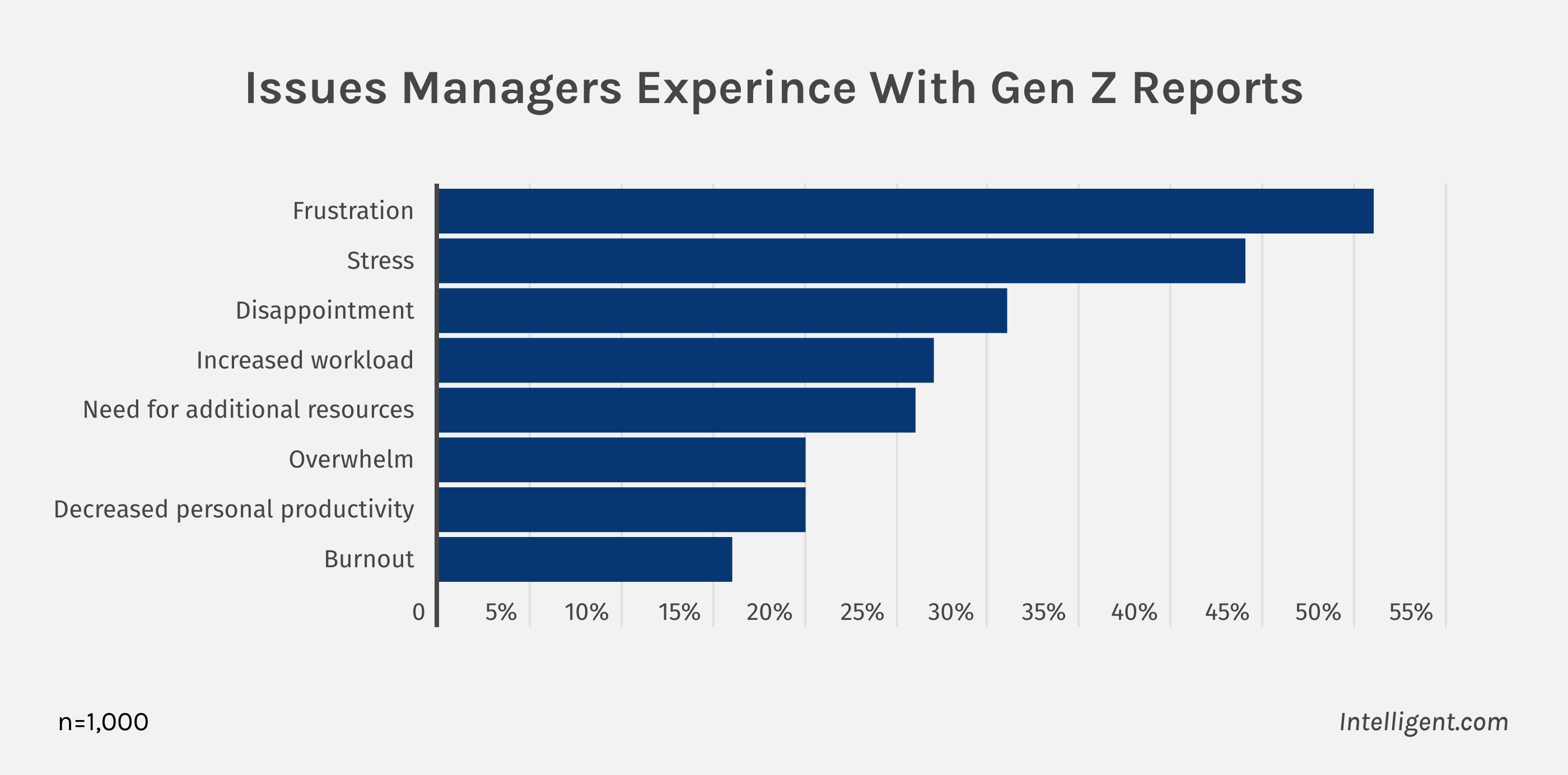
Part of this frustration and stress may come from a misalignment of expectations, says Intelligent.com’s chief education and career development advisor, Huy Nguyen.
“While soft skills like communication, time management, and teamwork are essential, it’s worth considering the new grads, especially those in recent years, have had fewer opportunities to develop these skills through traditional methods such as internships or in-person work, partially due to the pandemic,” Nguyen says. “Gen Z employees come in with stronger technical skills than previous generations but may lack the practical experiences gained through traditional work environments. Managers should recognize this shift and consider reevaluating their expectations to provide more structured guidance and become more of a coach than a boss.”
When working with Gen Z, Nguyen says, “It’s important to establish clear guidelines for communication and work processes so all parties understand what is expected of them,” Nguyen adds. “Without organizing the flow of work and understanding codependencies, things can become chaotic, and misunderstandings can easily escalate to bigger problems.”
Gen Zs’ excessive phone use and poor work ethic are top challenges for managers
According to 50% of the managers surveyed, Gen Z’s excessive phone use in the workplace has been the biggest challenge in managing this age group.
Other challenges that managers report include Gen Z’s poor work ethic (47%), lack of initiative (45%), poor time management skills (44%), and lack of professionalism (43%).
When digging deeper into the areas in which Gen Z employees lack professionalism, 58% of managers say that Gen Zers are unprofessional in their attitudes. Fifty-three percent find their communication skills unprofessional, and 45% say how Gen Z employees receive feedback is unprofessional.
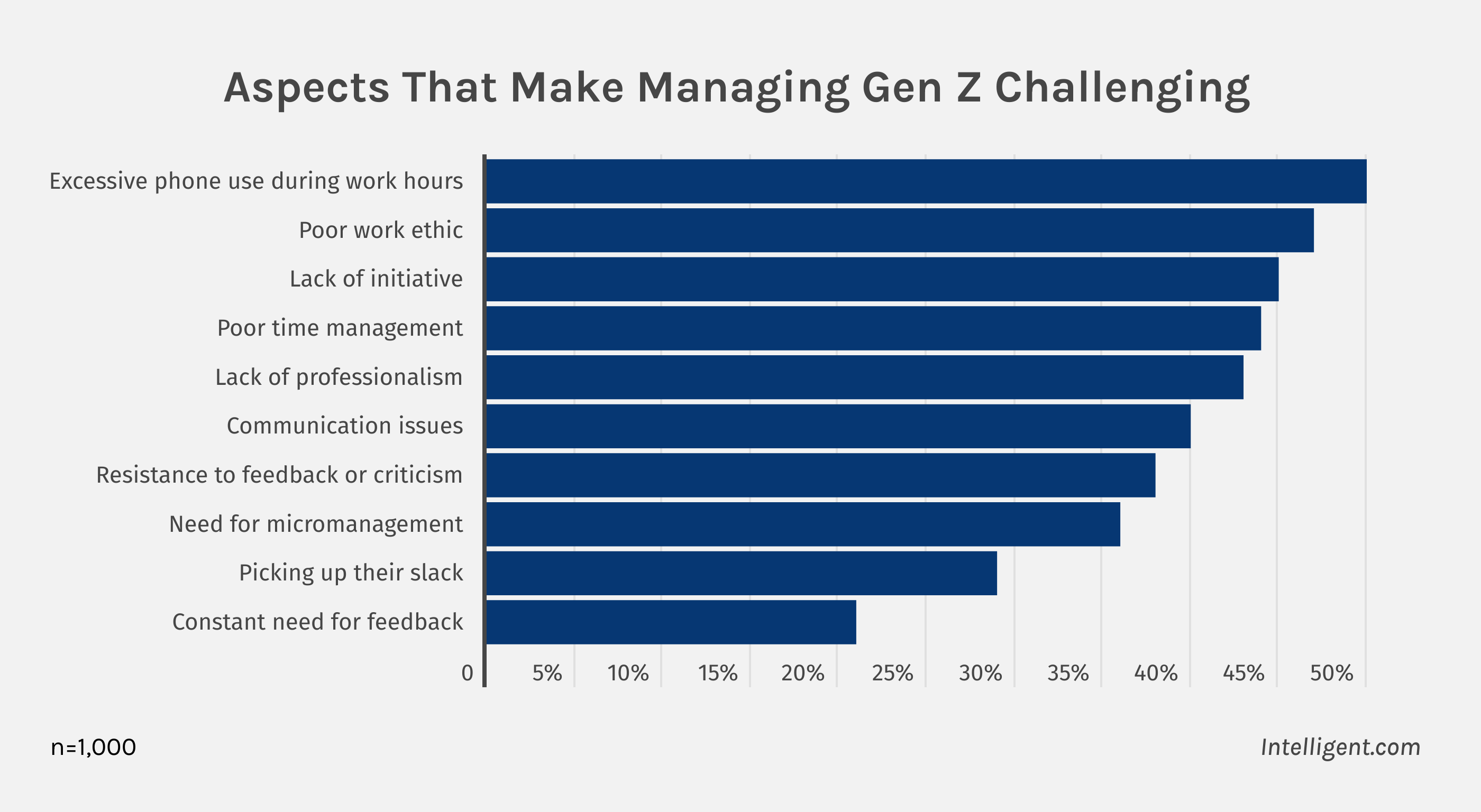
2 in 3 Managers Report Adjusting their Management Style to Accommodate Gen Z Employees
The challenges of working with Gen Z employees have forced the majority of managers (65%) surveyed to adapt to their management styles. Forty-four percent say they provide more frequent feedback to Gen Z employees. Other accommodations include micromanaging (38%), adjusting management style for work-life balance (35%), and allowing more time for work to be completed (32%).
Three in four managers say that compared to other generations, managing Gen Z employees requires more time and resources, while 54% have had Gen Zers communicate with them in an inappropriate tone or manner.
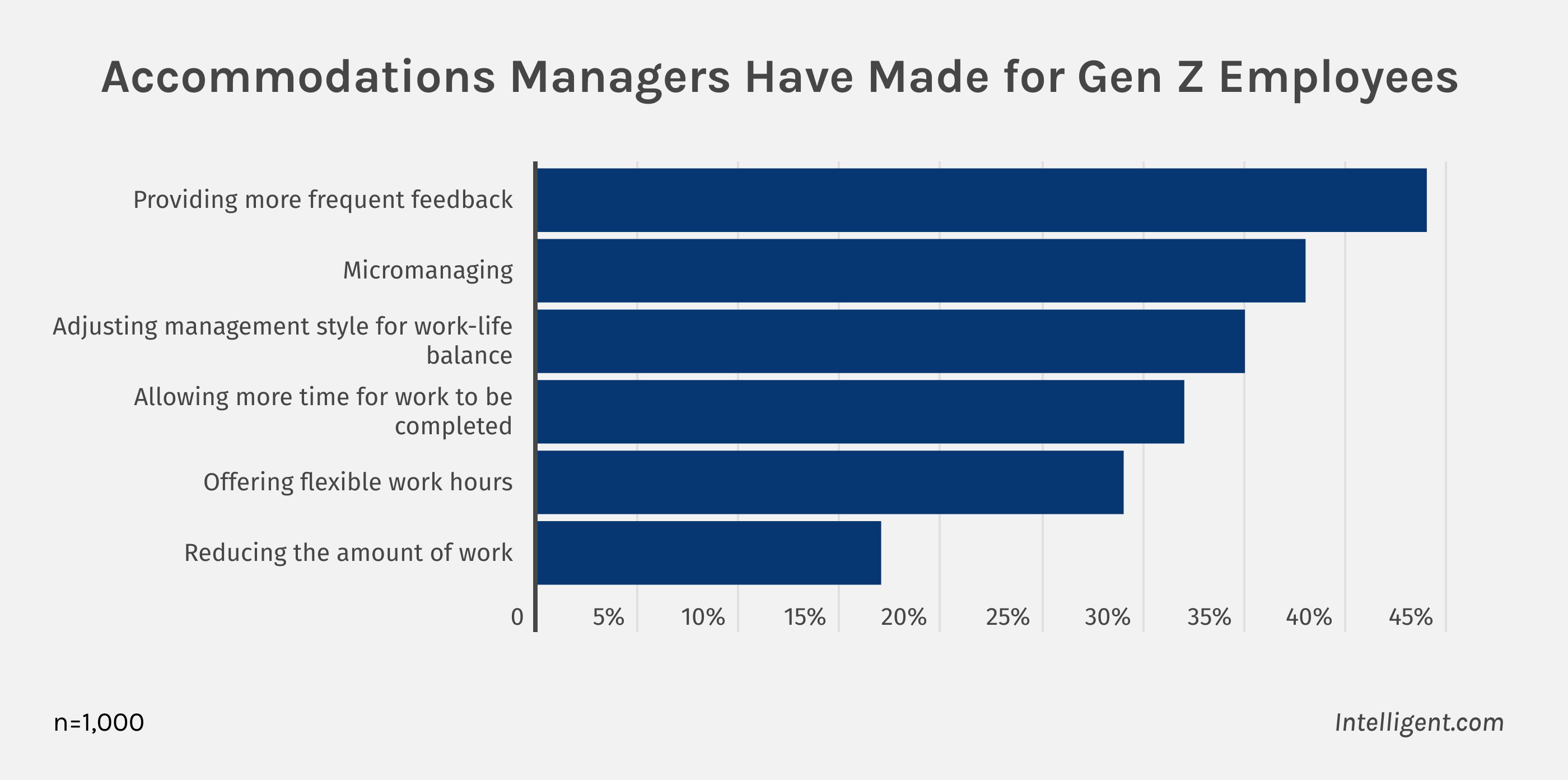
“As Gen Z continues to enter the workforce in greater numbers and older generations phase out, employers definitely need to be more proactive in evaluating their workplace culture,” Nguyen says. “Gen Z’s demands for flexibility can push companies to adopt new technologies and modernize their work processes, becoming more agile and resilient to the fast-paced changes in today’s digital work environment.”
However, he notes, “There is the potential for new employees to develop an over-dependence on feedback and guidance, preventing them from establishing their own autonomy, which is crucial for career progression.”
More than half of managers say Gen Zers cause tension with older generations
In addition to the challenges of directly interacting with Gen Z employees, 52% of managers also say that Gen Z workers cause tension among employees from older generations.
Workplace attitudes and expectations are the biggest source of conflict between Gen Z and employees from other generations, with 76% of managers citing this as an issue.
Other top issues between younger and older employees include communication problems (62%), differing priorities (47%), and clashes over work styles (42%).
Fifty-four percent of managers report that Gen Zers’ work habits lower overall team productivity.
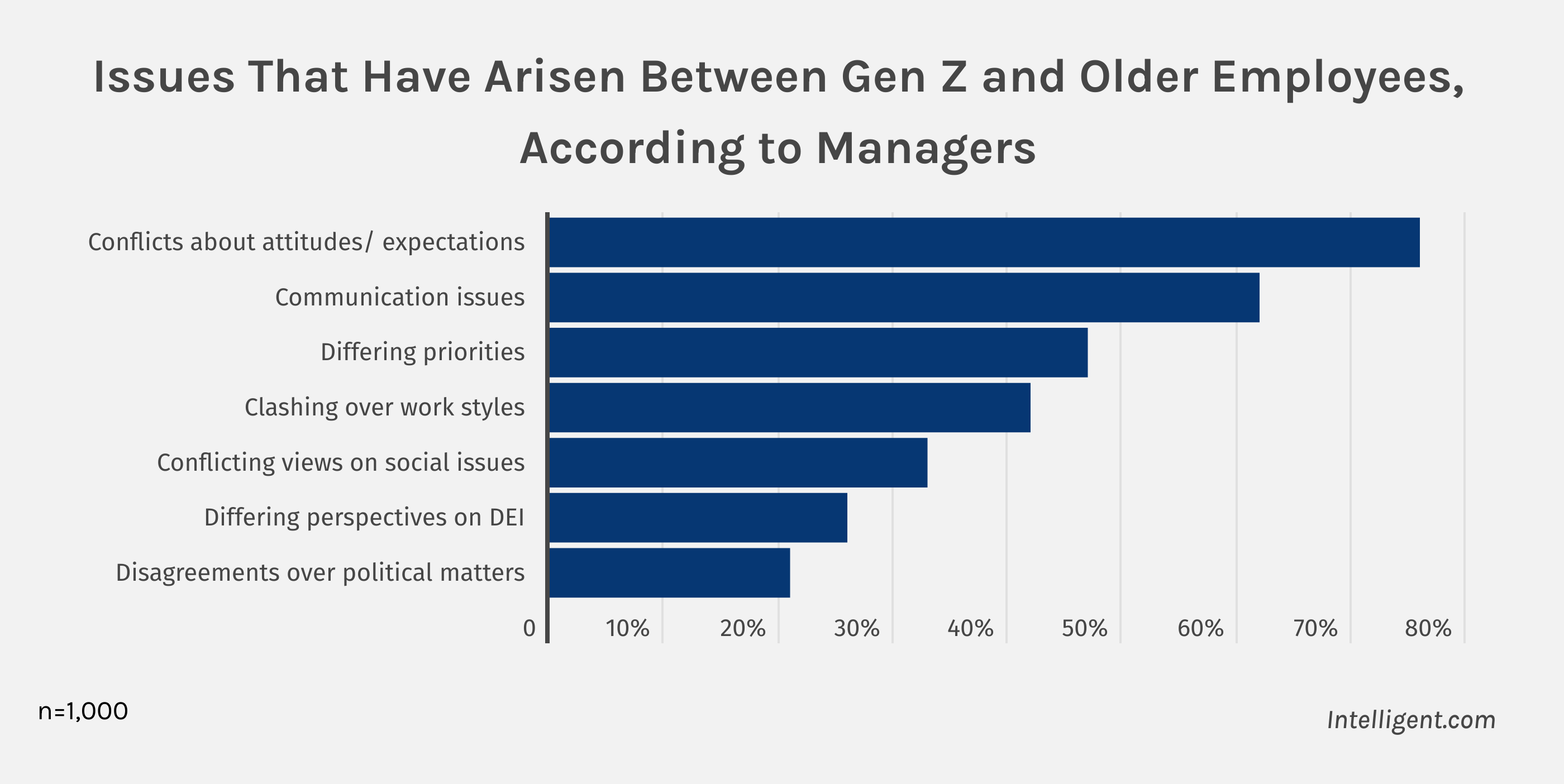
“Intergenerational workplace tension is nothing new and has been prevalent for many decades,” Nguyen says. “With each new cohort that enters the workplace, there is a natural period of adjustment where existing employees, who have been working for many years, may feel challenged by the next generation’s attitudes, priorities, and work styles. With Gen Z, the differences have been magnified by the amount of online content and the rapid spread of content from non-traditional channels.”
1 in 4 Managers Would Avoid Hiring Gen Zers
In light of these challenges, 50% of managers say they have fired a Gen Z report, and 27% say they would avoid hiring Gen Z if possible.
When asked why they continue to hire Gen Z employees, 54% say they do so to fill junior positions. Other reasons managers continue to hire Gen Z include the cost-effectiveness of this age group (47%) and concerns about ageism (34%).
Respondents also shared they hire Gen Z employees due to a lack of applicants from other age brackets.
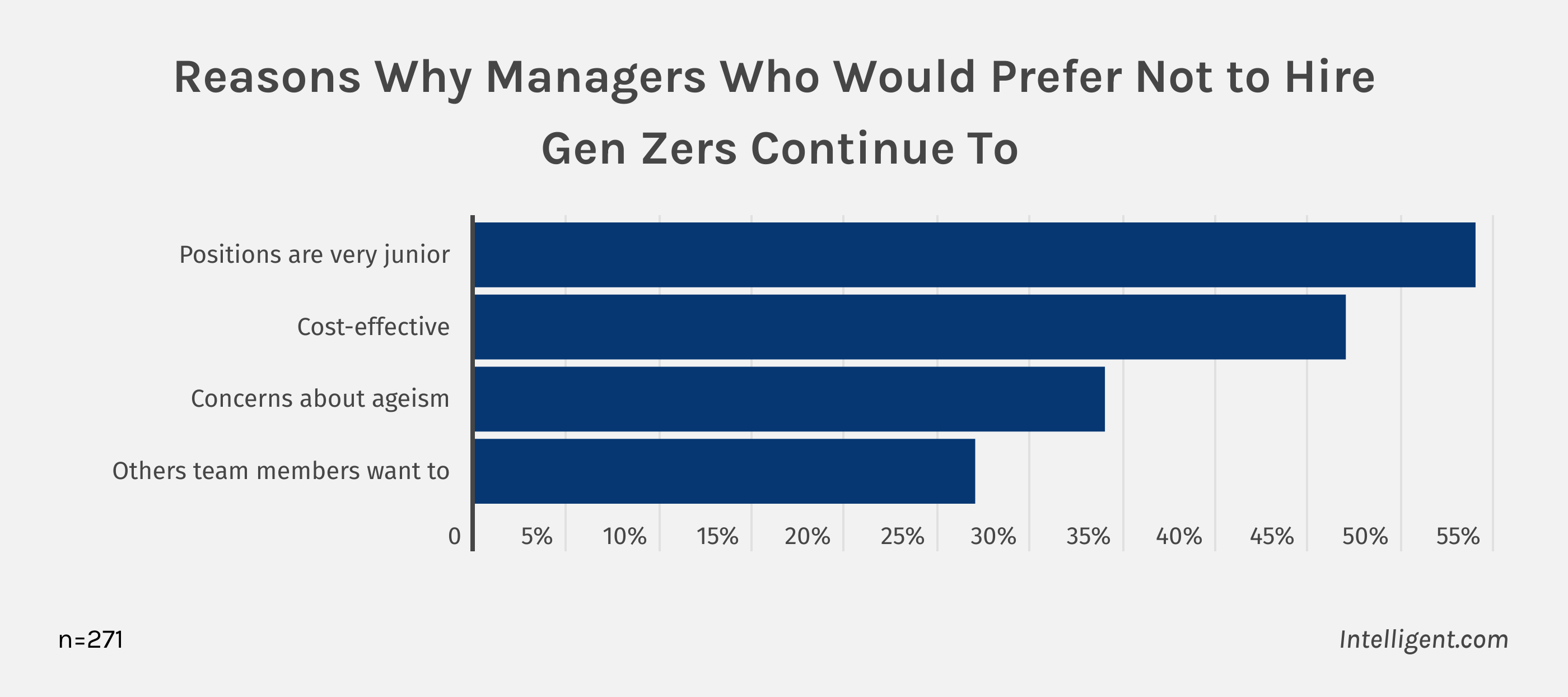
Methodology
This online poll was commissioned by Intelligent.com and conducted on Pollfish in October 2024. In total, 1,000 U.S. managers completed the survey.
Demographic criteria and screening questions were used to ensure qualified respondents. This criteria included age (28+), household income (>$75,000), organizational role (group manager, senior manager, manager, or program manager), and company size (>11). Respondents had to indicate that they currently manage Gen Z employees.
Media inquires can be directed to pr@intelligent.com.